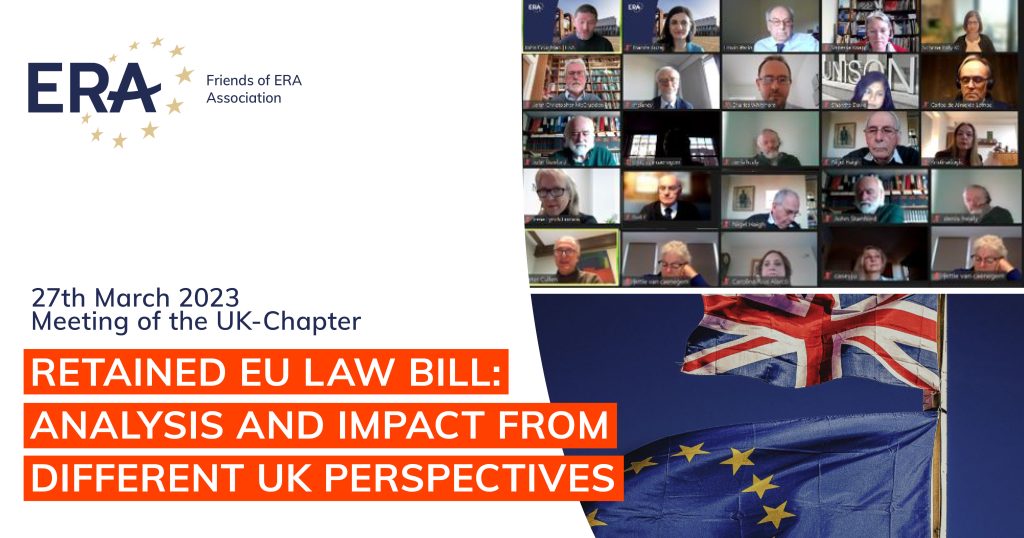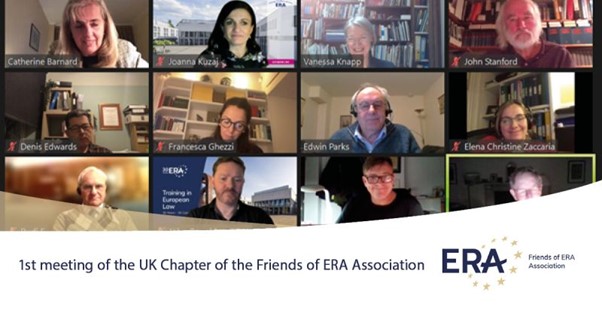INVITATION
The UK Chapter of the Friends of ERA Association will be organising an online panel debate on 16 January 2024. If you would like to join us and are not yet a member, please fill in this form including your payment details as this event is reserved for Association members only.
Reduction of Rights of UK Citizens after Brexit
Online, 16 January 2024
The reduction of rights of UK Citizens after Brexit creates challenges for people in the United Kingdom. We are honoured to invite you to a panel discussion at which a range of speakers will shed light on the issue, including differences in Scotland and the Illegal Migration Act 2013.
On 16 January 2024, the UK Chapter of the Friends of ERA is running another online event with a panel of outstanding experts to exchange their views and perspectives on the topic:
Our guest speakers:
- Michael Clancy OBE, Chairman of the International Bar Association Constitution and Governance Committee and Director of Law Reform at the Law Society of Scotland.
- David Jones, Garden Court Chambers, practising in the areas of immigration, human rights, EU free movement and nationality law.
- Professor Elspeth Guild, Jean Monnet Professor ad personam at Queen Mary University of London as well as at the Radboud University Nijmegen, Netherlands; Visiting Professor at the College of Europe, Bruges.
Join us on Tuesday, January 16th at 6:00pm (GMT) by signing up this registration link.
The event is open to all members of the Friends of ERA Association as well as the Young Friends of ERA network.
If you are interested in attending and are not yet member of the Friends of ERA, you can join here.
If you have any colleagues who would like to attend the presentations and discussion after, please forward this email to them too. They will also need to become Friends of ERA.
We look forward to seeing you there.
Previous events
Panel Discussion on the Retained EU Law Bill: Analysis and impact from different UK perspectives
Online, 27th March 2023
On 27th March 2023 we were happy to host the second meeting of the UK Chapter of the Friends of ERA, dedicated to the Retained EU Law (Revocation and Reform) Bill: Analysis and impact from different UK perspectives.
We would like to give special thanks to our panellists:
Schona Jolly KC (presenting on the Bill on EU law in England)
Shantha David (presenting on the Bill regarding the Labour Union)
Charles Whitmore (presenting on the Bill regarding EU law in Wales)
Michael Clancy OBE (presenting on the Bill regarding EU law in Scotland)
Christopher McCrudden (presenting on the Bill on EU law and Protocol on Ireland/Northern Ireland)
The speakers gave excellent synopses from the perspectives of the four nations of the UK, and of specific sectors, about the challenges and uncertainty of its uniform application throughout the four nations and constitutional effects on devolution. Since the Bill would automatically revoke, or ‘sunset’, most retained EU law by the end of 2023, a key issue noted was the overarching power it vested in the executive through statutory instrument to change significant and wide-reaching bodies of retained EU law.
Many thanks to our chair Edwin Parks and board member Vanessa Knapp OBE, who both contributed actively to the success of the discussion.
We were joined by 34 Friends from the UK and beyond for a stimulating discussion.

First meeting of UK Chapter of the Friends of ERA
with guest speaker Catherine Barnard
Online event, 16th March 2022 on Zoom
We were fortunate to welcome 22 new UK associates who joined us on 16 March 2022 for the first meeting of the Friends of ERA with Catherine Barnard.
Prof Barnard gave a presentation on the TCA and initiated a thought-provoking debate focusing on the UK’s approach to negotiating its new trading relationship. Later she engaged the participants in a lively discussion about the EU/UK Trade and Cooperation Agreement. We were delighted that there seems to be a strong view that EU law and the UK’s relationship to it is still important for UK lawyers.
As a small souvenir from this first UK Chapter event and especially for those who could not make it to our virtual UK-Chapter room that evening, Prof. Barnard has shared her presentation.
We hope that this first meeting will be the first of many opportunities for intensive exchange and will provide a platform for networking among our newly acquired UK members of Friends of ERA. The event has been mentioned on our social media networks including LinkedIn (link to post) so be sure to follow us for future updates.
We also thank our chairs Vanessa Knapp OBE and Edwin Parks, who contributed significantly to the success of the evening and the participants with their lively contributions to the debate.
To find more information about the Friends of ERA or to join the Association, please click here.

